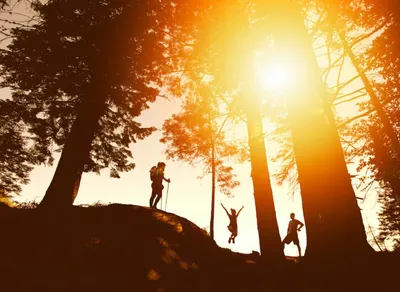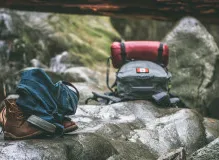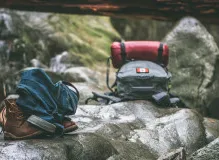For over long years, we have diligently conducted independent research and product testing. When you make a purchase through our links, we may earn a commission.
Discover the Enthralling Essence of Hiking Explained
Created: 1 month ago

14 min Read
Discover the Enthralling Essence of Hiking Explained
Explore the captivating world of hiking with our comprehensive guide. Uncover the essence, benefits, and tips for an unforgettable hiking experience. Get ready to embark on an adventure like no other. Start discovering today!
Why is Hiking and Trekking Good for You?
Hiking and trekking offer numerous benefits for both physical and mental well-being. Let's delve into the reasons why these outdoor activities are remarkably good for you:
1. Physical Fitness: Hiking and trekking are excellent forms of exercise that challenge your muscles and cardiovascular system. They help improve endurance, strength, and flexibility. By engaging in these activities, you can burn calories, lose weight, and maintain a healthy body.
2. Mental Health: Spending time in nature has been proven to have a positive impact on mental health. Hiking and trekking allow you to escape the hustle and bustle of daily life and immerse yourself in the serenity of the great outdoors. The tranquil surroundings, fresh air, and natural beauty can help reduce stress, anxiety, and depression.
3. Connection with Nature: Hiking and trekking provide a unique opportunity to connect with nature on a deeper level. Appreciating the scenic landscapes, breathing in the crisp air, and experiencing the sights and sounds of the wilderness can be immensely rejuvenating for the soul.
4. Vitamin D Absorption: Outdoor activities such as hiking and trekking expose you to sunlight, allowing your body to absorb essential vitamin D. Vitamin D is vital for maintaining bone health, supporting the immune system, and regulating mood.
5. Social Interaction: Hiking and trekking can be enjoyed alone or with friends and family. Engaging in these activities with others fosters social interaction, strengthens relationships, and creates lasting memories. It's an excellent way to bond with loved ones and share unforgettable experiences.
6. Stress Reduction: The act of hiking and trekking in itself helps to alleviate stress. The rhythmic movement, deep breathing, and focus required to navigate through the trails divert your mind from daily worries and promote a sense of calm and relaxation.
7. Self-Discovery and Personal Growth: Hiking and trekking can be challenging both physically and mentally. They push you to step out of your comfort zone, overcome obstacles, and discover your inner strength. These experiences contribute to personal growth, self-confidence, and a sense of accomplishment.
In conclusion, hiking and trekking offer a myriad of benefits for your overall well-being. From enhancing physical fitness to promoting mental health, these outdoor adventures can truly transform your life. So, why wait? Lace up your hiking boots, embrace the trails, and embark on an incredible journey of self-discovery and rejuvenation.
The Benefits of Walking: Improve Your Health and Well-being
Walking is a simple yet powerful form of exercise that offers a wide array of benefits for your health and well-being. Let's explore the numerous advantages of this low-impact activity:
-
Enhances Cardiovascular Health: Regular walking can improve your cardiovascular health by increasing your heart rate and strengthening your heart and lungs. It helps lower blood pressure, reduce the risk of heart disease and stroke, and improve overall circulation.
-
Weight Management: Walking is an effective way to manage weight and prevent obesity. It helps burn calories, boost your metabolism, and promote healthy weight loss. By incorporating brisk walking or interval training into your routine, you can maximize calorie burn and achieve your weight goals.
-
Strengthens Muscles and Bones: Walking is a weight-bearing exercise that helps build and maintain strong muscles and bones. It is especially beneficial for improving the strength and density of the lower body, including the legs, hips, and core. This can help prevent osteoporosis and reduce the risk of fractures.
-
Mental Well-being: Walking has a profound impact on mental health and well-being. It releases endorphins, which are natural mood boosters, and reduces stress and anxiety. It also improves cognitive function, memory, and overall brain health. Walking in nature or green spaces amplifies these benefits, providing a greater sense of tranquility and relaxation.
-
Improved Digestion and Metabolism: Walking aids digestion by stimulating the muscles of the abdomen and promoting the efficient movement of food through the digestive system. It also enhances metabolic function, helping the body effectively convert food into energy and maintain a healthy metabolism.
-
Joint Health and Mobility: Contrary to high-impact activities, walking is gentle on the joints while still providing excellent benefits. It helps lubricate the joints, strengthen the supporting muscles, and improve flexibility, thus reducing the risk of arthritis and enhancing overall joint health and mobility.
-
Boosts Immune Function: Regular walking can strengthen your immune system, making you less susceptible to illnesses and infections. It increases the production of white blood cells, which are essential for fighting off viruses and bacteria, and reduces the risk of chronic diseases.
-
Improved Sleep Quality: Walking has been shown to improve sleep quality and duration. It helps regulate the sleep-wake cycle and promotes a more restful night's sleep. By incorporating a daily walk into your routine, you can experience better sleep and wake up feeling refreshed and rejuvenated.
Incorporating a daily walk into your routine can have a significant positive impact on your overall health and well-being. From cardiovascular fitness to mental well-being and improved sleep quality, the benefits of walking are undeniable. Lace up your shoes, step outside, and start reaping the rewards of this simple yet powerful exercise.
Introduction to Hiking: Exploring Nature's Hidden Treasures
🌄 Let's embark on a journey to discover the enchanting world of hiking. In this introductory guide, we will explore the essence, benefits, and tips for a memorable hiking experience. So, grab your hiking boots, pack your backpack, and get ready to immerse yourself in the wonders of the great outdoors!
What Are the Benefits of Hiking and Trekking?
Hiking and trekking are not just outdoor activities; they offer a wide range of benefits for your physical, mental, and emotional well-being. Let's dive into the amazing benefits that await you on the trails:
-
Physical Fitness: Hiking and trekking are excellent forms of exercise that provide an enjoyable and effective way to stay fit. The varying terrains, inclines, and descents challenge your muscles, improve cardiovascular health, and enhance overall endurance. As you traverse through nature's wonders, you'll not only burn calories but also strengthen your body.
-
Mental Health: Connecting with nature has a profound impact on your mental well-being. Hiking and trekking allow you to escape the urban chaos and immerse yourself in the serenity of natural surroundings. The fresh air, scenic beauty, and peacefulness of the wilderness can reduce stress, anxiety, and depression, promoting a sense of calm and inner peace.
-
Exploration and Adventure: Have you ever dreamed of untamed landscapes, hidden trails, and breathtaking vistas? Hiking and trekking give you the opportunity to explore uncharted territories, discover new places, and unlock the adventurer within you. Each step becomes a thrilling adventure as you conquer challenging trails and uncover nature's hidden treasures.
-
Connection with Nature: In our digital age, connecting with nature has become more important than ever. Hiking and trekking offer an escape from technology and provide a chance to reconnect with the natural world. You'll witness awe-inspiring landscapes, encounter wildlife, and experience the wonders of flora and fauna. It's a fantastic way to appreciate the beauty and fragility of our planet.
-
Social Bonding: Hiking and trekking can be enjoyed alone or with friends and family. Sharing the trails with loved ones creates incredible bonding experiences and lasting memories. You can engage in meaningful conversations, support and motivate each other, and foster stronger relationships amidst the beauty of nature.
-
Self-Reflection and Growth: The trails offer moments of solitude and self-reflection, allowing you to discover more about yourself and your inner strengths. Hiking and trekking push you beyond your limits, helping you overcome challenges, build resilience, and boost self-confidence. It's an opportunity for personal growth and self-discovery.
-
Improved Overall Well-being: The combination of physical activity, fresh air, and the natural environment leads to improved overall well-being. Hiking and trekking can enhance your sleep quality, boost immune function, regulate metabolism, and improve heart health. Your body and mind will thank you for embracing the wonders of the trails.
So, whether you're a seasoned hiker or just starting out, the benefits of hiking and trekking are undeniable. From physical fitness to mental rejuvenation and exploration, each step brings you closer to a healthier and more fulfilling life. Lace up your boots, grab your backpack, and let the trails guide you towards a whole new world of adventure and well-being. 🏞️
What Are the Benefits of Hiking and Trekking?
Hiking and trekking offer a multitude of benefits for both your physical and mental well-being. Let's dive into the remarkable advantages that these outdoor activities provide:
Physical Fitness: Hiking and trekking engage your entire body, challenging your muscles and cardiovascular system. The varied terrain and inclines provide a great workout, improving your endurance, strength, and flexibility. By incorporating these activities into your routine, you can burn calories, achieve weight loss goals, and maintain a healthy body.
Mental Health: Spending time in nature has a profound impact on your mental well-being. Hiking and trekking allow you to escape the stresses of daily life and immerse yourself in the tranquility of the great outdoors. The peaceful surroundings, fresh air, and stunning natural beauty help reduce stress, anxiety, and depression, promoting a sense of peace and relaxation.
Connection with Nature: Hiking and trekking provide a unique opportunity to connect with nature on a deeper level. As you explore scenic trails, you'll witness breathtaking landscapes, encounter wildlife, and experience the wonders of flora and fauna. This connection with the natural world rejuvenates the soul and fosters a greater appreciation for our planet.
Physical Health Benefits: Engaging in hiking and trekking helps support your overall physical health in numerous ways. The activities promote cardiovascular fitness, strengthen muscles, and improve joint health and stability. Regular participation can also positively impact blood pressure, cholesterol levels, and reduce the risk of chronic diseases.
Social Interaction: Hiking and trekking can be enjoyed alone or with friends and family. Sharing these outdoor adventures with loved ones creates special bonding experiences and lasting memories. It provides an opportunity to engage in meaningful conversations, support and motivate each other, and strengthen relationships.
Stress Reduction: The act of hiking and trekking itself aids in stress reduction. The rhythmic movement, deep breathing, and focus required to navigate the trails divert your mind from daily worries and promote a sense of calm and relaxation.
Self-Discovery and Personal Growth: Hiking and trekking present opportunities for self-discovery and personal growth. These activities push you out of your comfort zone, challenge you both physically and mentally, and help you overcome obstacles. Through these experiences, you'll discover inner strength, build self-confidence, and achieve a sense of accomplishment.
In conclusion, the benefits of hiking and trekking are vast and impactful. From enhancing physical fitness and mental well-being to fostering a deeper connection with nature, these activities have the power to transform your life. So, lace up your hiking boots, grab your backpack, and embark on the journey of a lifetime. Experience the joy, serenity, and the incredible benefits that await you on the trails.
Choosing the Right Gear for Hiking:
When preparing for a hiking adventure, having the right gear is crucial for your comfort, safety, and overall enjoyment of the experience. Here are some essential items to consider when selecting your hiking gear:
-
Hiking Boots: Invest in a pair of sturdy and comfortable hiking boots that provide ankle support and have excellent traction. Your boots should be waterproof or water-resistant to handle various terrains and weather conditions.
-
Moisture-Wicking Clothing: Choose moisture-wicking clothing made of lightweight and breathable materials, such as polyester or merino wool. These fabrics draw sweat away from your body, keeping you dry and comfortable throughout your hike.
-
Layering System: Opt for a layering system to adjust to changing weather conditions. Start with a base layer that wicks away moisture, add an insulating layer for warmth, and top it off with a waterproof or windproof outer layer.
-
Backpack: Select a backpack that fits comfortably on your shoulders and hips. Look for one with multiple compartments to organize your gear and a supportive suspension system for weight distribution.
-
Navigation Tools: Carry a map and compass or a GPS device to navigate through trails. Familiarize yourself with the area beforehand and consider downloading offline maps or using hiking apps on your smartphone.
-
Headlamp: A reliable headlamp is essential for hiking, especially if you plan to start early or hike during dusk. Opt for one with different brightness settings and a long battery life.
-
First Aid Kit: Pack a compact first aid kit with essentials like adhesive bandages, antiseptic wipes, pain relievers, and any necessary prescription medications.
-
Hydration System: Stay hydrated on the trails by carrying a water bottle or a hydration bladder. Consider filters or purifying tablets if you'll be drinking water from natural sources.
-
Snacks and Meals: Pack lightweight and nutritious snacks like energy bars, nuts, and dried fruits. For longer hikes, consider bringing packed lunches or dehydrated meals that can be prepared with boiling water.
-
Sun Protection: Protect yourself from the sun's rays by wearing a wide-brimmed hat, sunglasses, and sunscreen with a high SPF rating. Consider lip balm with SPF protection as well.
-
Trekking Poles: Trekking poles can provide stability, reduce strain on your joints, and improve balance, especially on steep or uneven terrain. Choose poles with adjustable length and sturdy grips.
-
Insect Repellent: Depending on the location and season, it's essential to bring insect repellent to ward off mosquitoes, ticks, and other biting insects.
Remember, the specific gear you need may vary depending on the duration and difficulty of your hike, as well as the climate and terrain. Research the trail conditions and consult with experienced hikers or outdoor gear specialists to ensure you have all the necessary equipment. By investing in quality gear and preparing well, you'll be ready to tackle any hiking adventure with confidence, comfort, and safety.
Essential Hiking Tips for Beginners
Hiking is an incredible way to connect with nature, challenge yourself physically, and experience the wonders of the great outdoors. If you're new to hiking, here are some essential tips to help you get started on your hiking journey:
-
Start with Easy Trails: As a beginner, it's important to choose hiking trails that match your fitness level and experience. Look for trails that are marked as easy or beginner-friendly to gradually build your stamina and confidence.
-
Research and Plan: Before heading out on a hike, research the trail you'll be embarking on. Learn about its difficulty level, terrain, and distance. Plan your hike accordingly and make sure to check the weather forecast to ensure a safe and enjoyable experience.
-
Wear Appropriate Clothing: Dress in layers and wear moisture-wicking clothing to stay comfortable throughout your hike. Don't forget to wear proper hiking boots that provide ankle support and have good traction to prevent slips and falls.
-
Pack Essential Gear: Pack essential items such as a map, compass or GPS device, a first aid kit, a headlamp or flashlight, extra food, and plenty of water. It's also advisable to bring a fully charged cell phone for emergencies.
-
Start Early: Begin your hike early in the day to allow yourself ample time to complete the trail and avoid hiking during the hottest hours. Starting early also gives you the opportunity to enjoy the peacefulness of nature and witness breathtaking sunrise views.
-
Stay Hydrated and Fuel Up: Make sure to drink plenty of water throughout your hike to stay hydrated. Snack on lightweight and energy-rich foods to maintain your energy levels. Opt for trail mix, energy bars, or fruits that are easy to carry and provide a quick energy boost.
-
Take Breaks and Enjoy the View: Don't forget to take breaks along the trail to rest, refuel, and simply take in the beauty of your surroundings. Use these moments to appreciate nature and capture memorable photos.
-
Leave No Trace: Practice Leave No Trace principles by respecting the environment and leaving it as you found it. Dispose of trash properly, stay on the designated trail, and be mindful of wildlife and their habitats.
-
Hike with a Buddy: Hiking with a companion adds fun and safety to your adventure. If you're new to hiking, consider finding a hiking group or a friend who has experience to join you. Remember to inform someone about your hiking plans and estimated return time for added safety.
-
Listen to Your Body: Pay attention to how your body feels during the hike. If you experience any pain or discomfort, take a break and assess the situation. It's important to know your limits and prioritize your safety.
-
Enjoy the Journey: Hiking is not just about reaching the destination; it's about enjoying the journey. Take the time to admire the scenic views, listen to the sounds of nature, and embrace the serenity that hiking offers.
As you embark on your hiking journey as a beginner, remember to take it one step at a time and embrace the experience. With preparation, proper gear, and a positive attitude, hiking can become a rewarding and lifelong passion. So, lace up your hiking boots, hit the trails, and embark on an adventure that will leave you with unforgettable memories.









